翻译理论与实践 Final Exam
《翻译理论与实践》期末考试试卷附答案B卷

《翻译理论与实践》期末考试试卷附答案B卷一、单词翻译(共10题,每题2分,共20分)1、neutral2、meter3、sodium hydroxide4、external5、in the absence of6、间歇的;断断续续的7、复杂的8、依靠;由于9、限于10、粗粒子二、句子翻译(共5题,每题4分,共20分)1、Acid-base indicators (also known as pH indicators) are substances which change color with pH.2、I am bored with the dull office work.3、It’s my pleasure to offer some help to you.4、从大连到沈阳的直达特快火车什么时候离开?5、在周末,我们可以去游泳或去钓鱼。
三、段落翻译(共3题,每题20分,共60分)1、In metals, thermal conduction results from the motion of free electrons, and there is close correspondence between thermal conductivity and electrical conductivity. In solids that are poor conductors of electricity and in most liquids, thermal conduction results from momentum transfer between adjacent vibrating molecules or atoms. In gases, conduction occurs by the random motion of molecules, so that heat is “diffused” from hotter regions to colder ones.2、黄河是亚洲第三、世界第六长的河流。
翻译理论与实践智慧树知到答案章节测试2023年湖南中医药大学
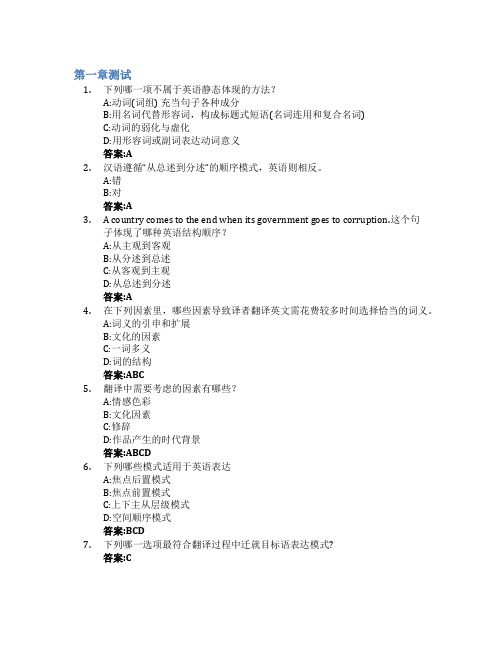
第一章测试1.下列哪一项不属于英语静态体现的方法?A:动词(词组) 充当句子各种成分B:用名词代替形容词,构成标题式短语(名词连用和复合名词)C:动词的弱化与虚化D:用形容词或副词表达动词意义答案:A2.汉语遵循“从总述到分述”的顺序模式,英语则相反。
A:错B:对答案:A3. A country comes to the end when its government goes to corruption.这个句子体现了哪种英语结构顺序?A:从主观到客观B:从分述到总述C:从客观到主观D:从总述到分述答案:A4.在下列因素里,哪些因素导致译者翻译英文需花费较多时间选择恰当的词义。
A:词义的引申和扩展B:文化的因素C:一词多义D:词的结构答案:ABC5.翻译中需要考虑的因素有哪些?A:情感色彩B:文化因素C:修辞D:作品产生的时代背景答案:ABCD6.下列哪些模式适用于英语表达A:焦点后置模式B:焦点前置模式C:上下主从层级模式D:空间顺序模式答案:BCD7.下列哪一选项最符合翻译过程中迁就目标语表达模式?答案:C8.以下哪些句子体现了增词翻译原则中的修辞性增词:A:At thirty-five, she had first learned what it is to be a mother. “她到35岁的时候才生平第一次尝到做母亲的滋味。
”B:There has been too much publicity about the case. “那件案子已经搞得满城风雨,人尽皆知了。
”C:We couldn’t count on his rationality. “我们不能指望他会讲道理。
”D:A. “Sesame street” is popular among children. “芝麻街少儿频道再儿童中很受欢迎。
”答案:AB9.英语表达中,动词地位不平等是客观存在的事实,主要体现在A:过去分词结构B:不定式结构C:现在分词结构D:无动词结构答案:ABCD10.汉语结构中主语缺失是一种十分普遍的现象,而英语中是不允许存在的。
中石油18年8月《翻译理论与实践》在线考试客观题
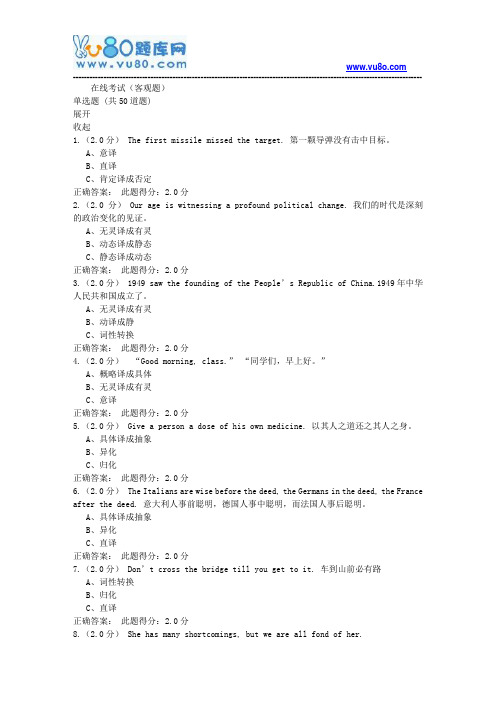
------------------------------------------------------------------------------------------------------------------------------ 在线考试(客观题)单选题 (共50道题)展开收起1.(2.0分) The first missile missed the target. 第一颗导弹没有击中目标。
A、意译B、直译C、肯定译成否定正确答案:此题得分:2.0分2.(2.0分) Our age is witnessing a profound political change. 我们的时代是深刻的政治变化的见证。
A、无灵译成有灵B、动态译成静态C、静态译成动态正确答案:此题得分:2.0分3.(2.0分) 1949 saw the founding of the People’s Republic of China.1949年中华人民共和国成立了。
A、无灵译成有灵B、动译成静C、词性转换正确答案:此题得分:2.0分4.(2.0分)“Good morning, class.”“同学们,早上好。
”A、概略译成具体B、无灵译成有灵C、意译正确答案:此题得分:2.0分5.(2.0分) Give a person a dose of his own medicine. 以其人之道还之其人之身。
A、具体译成抽象B、异化C、归化正确答案:此题得分:2.0分6.(2.0分) The Italians are wise before the deed, the Germans in the deed, the France after the deed. 意大利人事前聪明,德国人事中聪明,而法国人事后聪明。
A、具体译成抽象B、异化C、直译正确答案:此题得分:2.0分7.(2.0分) Don’t cross the bridge till you get to it. 车到山前必有路A、词性转换B、归化C、直译正确答案:此题得分:2.0分8.(2.0分) She has many shortcomings, but we are all fond of her.------------------------------------------------------------------------------------------------------------------------------A、她虽然有很多缺点,但我们都很喜欢她。
翻译理论与实践II期末考试题型

翻译理论与实践II期末考试题型第一篇:翻译理论与实践II期末考试题型期末考试题型Part I.Multiple Choice(30 points, 1 point each)Directions: This part consists of thirty sentences, each followed by four different versions marked A, B, C and D.Choose the one that you think is the closest equivalent of the original in terms of meaning and expressiveness.(Please write the corresponding letter on the answer sheet.)Example:破镜虽已粘补,但既不美观,又不牢固。
[A] A mirror that has been glued back together has an unsightly flaw and breaksagain easily.[B] Though it can be glued back together, a mirror does not look beautiful butfragile.[C] A broken mirror, though glued back together, does not look beautiful butfragile.[D] A broken mirror, though glued back together, has an unsightly flaw and breaks again easily.答案是:APart II.Translate the idioms into English.(30 points, 1.5 points each)(共20个成语)Part III.Translation Improvement(15 points, 1.5 points each) Directions: Each of the following English translations has one or more inadequacies.Improve the given translations.Example:原文:能为他的这本散文集子作序,我觉得很荣幸。
翻译理论与实践(汉译英)习题及参考答案

翻译理论与实践(汉译英)习题第一周词的选择复习思考题:翻译下列句子,注意选词:我的表不准,每天快十多分钟。
时间过得真快!情人节快到了。
这把刀很快。
参考译文:My watch doesn’t keep good time. It gains more than ten minutes a day.How time does fly!Valentine’s Day is near. Or:Valentine’s Day is at hand. Or:Valentine’s Day is drawing near.The knife is really sharp. (*The knife is swift.)第二周词语翻译技巧(词义引申)复习思考题练习:根据本节所讲进行选词1.人民现在为什么拥护我们?就是这十几年有发展。
2.由于全球气候变暖,海平面在一点点地上升。
3.改革开放也使民族精神获得了解放。
4.我们的企业应着重提高国际竞争力。
5.中国的现代化建设离不开与世界各国的经济合作与贸易往来。
6.世界科技进步和产业结构的调整,亚太地区经济的迅速增长,给我国经济发展提供了有利条件。
在我国中长期发展中,也有不可制约的因素,突出的是:……7.在1993年亚太经合组织第一次领导人非正式会议上,我曾说过,把一个什么样的世界带到二十一世纪,是我们这一代领导人必须认真思考和解决的重大问题。
环顾新世纪初的世界和亚太地区形势,可以说是有喜有忧。
8.为了进行认真细致的考察,他很少乘车坐船,几乎全靠双脚翻山越岭,长途跋涉;为了弄清大自然的真相,他总是挑选道路艰险的山区,人迹稀少的森林进行考察,发现了许多奇山秀景。
9.专家普遍认为积极的财政政策对于最近几年的经济快速增长势头起了很大作用,2003年,这一政策的实施除了应向社会保障,农村教育及基础设施倾斜以外,还应从政府投资转向民间投资。
10.这些价值观和孔子宣扬的一些思想有很多相同之处,孔子的思想强调的是中庸适度。
翻译理论与实践出版考核试卷

14. ABCD
15. ABCD
16. ABCD
17. ABC
18. ABC
19. ABCD
20. ABCD
三、填空题
1.雅
2.归化
3.文化
4.功能
5.预期
6.语境
7.审校
8.音译
9.专业素养
10.交际
四、判断题
1. ×
2. ×
3. √
4. ×
5. ×
6. √
7. ×
8. ×
9. √
10. ×
C.词汇的替换
D.语法结构的调整
2.以下哪一项不是翻译标准的基本原则?()
A.忠实
B.通顺
C.简洁
D.有创造性
3.在翻译实践中,直译通常指的是()
A.逐字翻译
B.保持原文风格
C.保留原文文化色彩
D.按照目标语的习惯调整
4.以下哪种翻译策略属于意译?()
A.保留原文的比喻
B.替换原文的比喻为适合目标语文化的表达
翻译理论与实践出版考核试卷
考生姓名:__________答题日期:_______年__月__日得分:____________判卷人:__________
一、单项选择题(本题共20小题,每小题1分,共20分,在每小题给出的四个选项中,只有一项是符合题目要求的)
1.翻译活动的本质是()
A.语言的转换B.文化传播的程()8.以下哪种翻译策略通常用于处理专业术语和行业用语:______。
()
9.翻译理论与实践的结合,有助于提升译者的______和翻译技能。
()
10.在翻译出版考核中,不仅要考察译者的语言能力,还要考察其______能力。
翻译理论与实践考试试卷
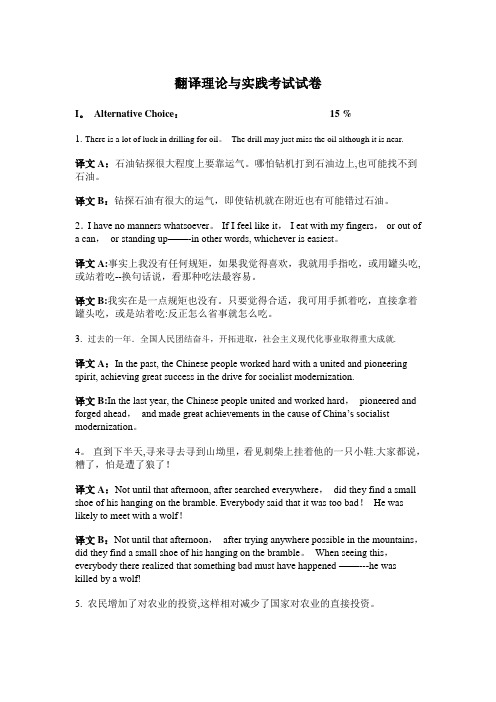
翻译理论与实践考试试卷I。
Alternative Choice:15 %1. There is a lot of luck in drilling for oil。
The drill may just miss the oil although it is near.译文A:石油钻探很大程度上要靠运气。
哪怕钻机打到石油边上,也可能找不到石油。
译文B:钻探石油有很大的运气,即使钻机就在附近也有可能错过石油。
2.I have no manners whatsoever。
If I feel like it,I eat with my fingers,or out of a can,or standing up——-in other words, whichever is easiest。
译文A:事实上我没有任何规矩,如果我觉得喜欢,我就用手指吃,或用罐头吃,或站着吃--换句话说,看那种吃法最容易。
译文B:我实在是一点规矩也没有。
只要觉得合适,我可用手抓着吃,直接拿着罐头吃,或是站着吃:反正怎么省事就怎么吃。
3. 过去的一年.全国人民团结奋斗,开拓进取,社会主义现代化事业取得重大成就.译文A:In the past, the Chinese people worked hard with a united and pioneering spirit, achieving great success in the drive for socialist modernization.译文B:In the last year, the Chinese people united and worked hard,pioneered and forged ahead,and made great achievements in the cause of China’s socialist modernization。
《翻译理论与实践(笔译)》期末复习辅导
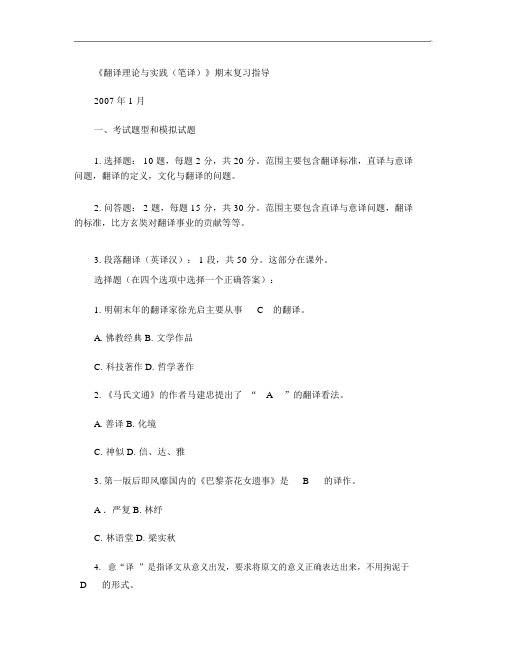
《翻译理论与实践(笔译)》期末复习指导2007年 1 月一、考试题型和模拟试题1.选择题: 10 题,每题 2 分,共 20 分。
范围主要包含翻译标准,直译与意译问题,翻译的定义,文化与翻译的问题。
2.问答题: 2 题,每题 15 分,共 30 分。
范围主要包含直译与意译问题,翻译的标准,比方玄奘对翻译事业的贡献等等。
3.段落翻译(英译汉): 1 段,共 50 分。
这部分在课外。
选择题(在四个选项中选择一个正确答案):1.明朝末年的翻译家徐光启主要从事 ---C---的翻译。
A. 佛教经典B. 文学作品C. 科技著作D. 哲学著作2.《马氏文通》的作者马建忠提出了“---A--- ”的翻译看法。
A. 善译B. 化境C. 神似D. 信、达、雅3.第一版后即风靡国内的《巴黎茶花女遗事》是 --B---- 的译作。
A .严复 B. 林纾C. 林语堂D. 梁实秋4.意“译”是指译文从意义出发,要求将原文的意义正确表达出来,不用拘泥于--D---- 的形式。
A. 词句B. 词句和比喻C. 各种修辞手段D. 词、句、以及各种修辞手段5.翻译是一种( A )的交际活动。
6.翻译的理想单位是: __________。
()7.以下四个语言特色中, ----B-- 不是广告英语的特色。
A. 多祈使句B. 多后置定语C. 多新词汇D. 多常用词汇8. 鲁迅曾提出过“-------B-------- ”的翻译看法。
A. 宁顺而不信B. 宁信而不顺C.与其信而不顺,不如顺而不信D.忠实、通畅、得体9.在以下四组特色中, ---D--- 组吻合英语语言的实质状况。
A.重意合,多主动结构,多动向词,多重复,多生物词作主语B.重形合,多主动结构,多动向词,多代替,多物称词作主语C.重意合,多被动结构,多静态词,多重复,多生物词作主语D.重形合,多被动结构,多静态词,多代替,多物称词作主语10.以下四种语言特色, ----B---- 不吻合英语语言的实质状况。
翻译理论与实践课后习题答案

第一章翻译概论第一节中外翻译史简介四、课内练习1. 东汉至唐宋时期。
2. 玄奘不仅译出了75 部佛经,而且还把老子的部分著作译成梵文,成为第一个向国外介绍汉语著作的中国人。
3. 20 世纪初的“五四”新文化运动,开创了白话文学和白话翻译的新纪元,语言从文言正宗转为白话本位。
五四运动前后,东西方各国的优秀文学作品,特别是俄国和苏联的作品开始被介绍进来,《共产党宣言》等一批马克思主义著作的译文就发表在“五四”时期,为中国后来的革命做了充分的理论和思想准备。
4. 圣经的翻译成为了西方翻译研究的重要源头之一。
5. 中外悠久的翻译历史已为我们积累了一份宝贵的文化遗产。
我们应当认真总结前人的翻译经验,借鉴吸收前人从实践中总结出的理论、方法,以便继续提高我们的翻译水平,为中外文化交流做出自己的贡献。
五、课后练习(一)将下列段落译成中文:一百年前的今天:一些海鸥;北卡罗来纳州杀魔山海岸警卫队的三个队员;救生站以及一些本地人,见证了威尔帕·莱特(Wilbur Wright)和奥维尔·莱特(Orville Wright)兄弟的第一次机动飞机飞行。
1903 年12 月17 日,莱特兄弟第一次用比空气重的飞行器进行了有动力的持续飞行。
1932 年,90 英尺高的杀魔山顶立起了一座60 英尺高的花岗岩纪念碑,用以纪念这两个来自俄亥俄州代顿市的梦想家。
莱特兄弟来自于美国中部。
他们有着天空般广阔的眼界,也有着十分务实的作风。
1892 年,他们在俄亥俄州的代顿开创了自己的自行车企业:莱特自行车公司。
虽然在当时世纪之交的美国,有着数不清的自行车公司,但只有一个在造轮子的同时造出了翅膀。
当莱特兄弟在1903 年最终着眼于动力载人飞行器,他们成功地使世界变小了……(二)将下列段落译成英文:As Jia baoyu,Xue Baoqin,Xing youyan and Ping’er had birthdays on the same day,the young ladies held a hilarious drinking party in the hall of the peony garden for them. When it was Xiangyun’s turn to compose a verse amid a drinking game,she made fun of the service maids by saying,holding a duck head in hand,“This ya tou (referring to the duck head in hand)is not that ya tou (referring to the service maids around,as both are homophones in Chinese),for this ya tou has applied no hair oil….”Everybody roared with laughter. Some service maids protested,laughing,“You made fun of us,so you have to drink another cup. Let’s pour a full cup her….”As the party went on drinkers’games continued with ceaseless laughter and people suddenly noticed that Xiangyun had disappeared. While they looked this way and that,a service maid rushed in laughing,“Young ladies. Hurry to have a look at the Lady Xiangyun. She’s sleeping on the stone bench over there.”The group tiptoed over,and sure enough,saw Xiangyun sleeping soundly. Fallen flowers scattered on her body,her hair and her face. Her fan had dropped on the ground aside. Bees danced in the air around her. Under her head was a make-shift pillow of peony flowers wrapped with her handkerchief. Amid laughter service girls gently woke her up and helped her-she was still mumbling something drunkenly-get inside theroom.第二节翻译的定义与性质四、课内练习(一)将下列英文译成中文:1. 海蒂读过阿瑟的信后陷入了绝望之中。
《翻译理论与实践》期末试卷
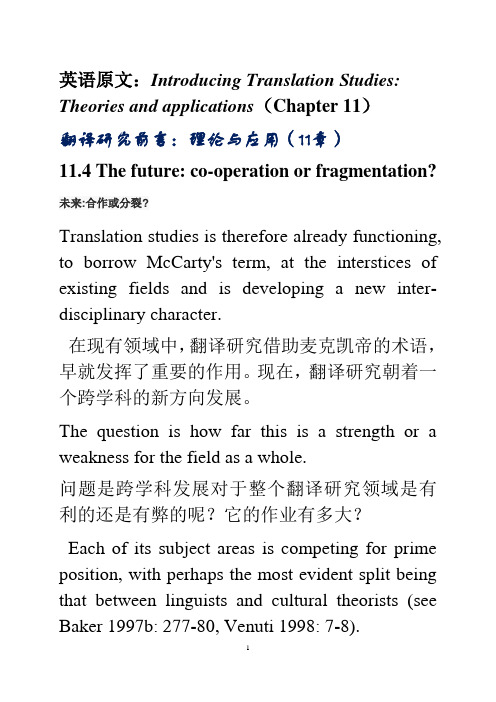
英语原文:Introducing Translation Studies: Theories and applications(Chapter 11)翻译研究前言:理论与应用(11章)11.4 The future: co-operation or fragmentation? 未来:合作或分裂?Translation studies is therefore already functioning, to borrow McCarty's term, at the interstices of existing fields and is developing a new inter-disciplinary character.在现有领域中,翻译研究借助麦克凯帝的术语,早就发挥了重要的作用。
现在,翻译研究朝着一个跨学科的新方向发展。
The question is how far this is a strength or a weakness for the field as a whole.问题是跨学科发展对于整个翻译研究领域是有利的还是有弊的呢?它的作业有多大?Each of its subject areas is competing for prime position, with perhaps the most evident split being that between linguists and cultural theorists (see Baker 1997b: 277-80, Venuti 1998: 7-8).在跨学科翻译研究中,每个学科想获得最好的地位而相互竞争。
在语言学家和文化理论家之间的竞争最为激烈,这也导致语言学科和文化学科之间的分裂也更明显。
(见贝克1997b:277-80,韦努蒂1998:7-8)。
The former dominated in the 1950s and 1960s, while in the last decade linguistic theories have been marginalized by scholars moving within, or adopting the practices of, other disciplines.在20世纪50年代和60年代的之间语言学科一直处于上风,但在过去的十年中,语言学理论一直被学术界的学者们所排斥,或是采用其他学科的做法。
翻译理论与实践(全套)PPT课件

导学——课时安排
课时安排:
教学内容
导学
第一章:翻译概述
第二章:英汉语言对比 第三章:词语的翻译
第四章:句子翻译技巧(上) 第五章:句子翻译技巧(下) 第六章:常见文体的翻译
注:可能 因授课实际情况,课时安排会做适当调整。
课时 2 2 2 2 2 2 4
14
导学——学法指导
译者素养:
➢译者的素质: 外语素质 语言敏感度 心理素质
导学——课程要求
Tests: 60% There will be only one test: a final. But there may also be
several short quizzes through the term. Attendance: 20%
Daily attendance will be recorded. Each time a student will get 2.5 points. 1point for attendance, 1 point for being on time, and 0.5 point for participating in discussion and interacting positively with fellow classmates.
二、教学过程:
1. 增译法 2. 省译法 3. 词类转换 4. 正说反译、反说正译法 5. 翻译练习1、2、3、4
7
第五章:句子翻译技巧(下)
一、教学目的:要求熟练理解句子的翻译技 巧,从而在汉英翻译时做到通顺、准确。
二、教学过程:
1. 重译法 2. 语态变换法 3. 词序调整法 4. 拆译法 5. 翻译练习1、2、3、4
We should take considerable ( or a good portion of ) responsibility for the problems that arouse. 19
翻译理论与实践(TranslationtheoryandPractice)
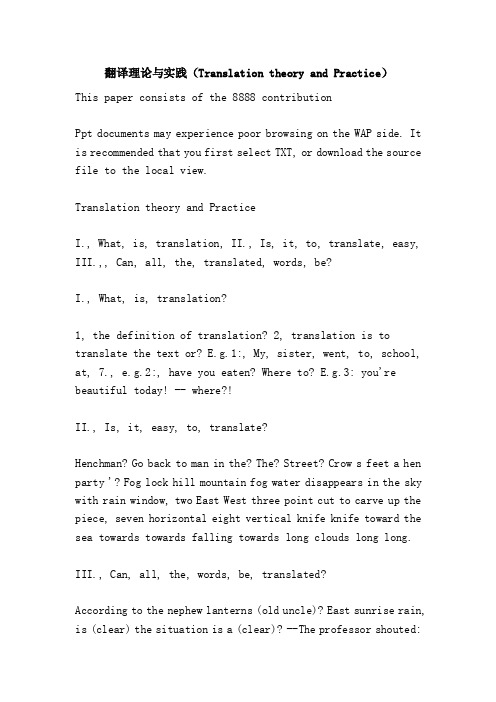
翻译理论与实践(Translation theory and Practice)This paper consists of the 8888 contributionPpt documents may experience poor browsing on the WAP side. It is recommended that you first select TXT, or download the source file to the local view.Translation theory and PracticeI., What, is, translation, II., Is, it, to, translate, easy, III.,, Can, all, the, translated, words, be?I., What, is, translation?1, the definition of translation? 2, translation is to translate the text or? E.g.1:, My, sister, went, to, school, at, 7., e.g.2:, have you eaten? Where to? E.g.3: you're beautiful today! -- where?!II., Is, it, easy, to, translate?Henchman? Go back to man in the? The? Street? Crow s feet a hen party '? Fog lock hill mountain fog water disappears in the sky with rain window, two East West three point cut to carve up the piece, seven horizontal eight vertical knife knife toward the sea towards towards falling towards long clouds long long.III., Can, all, the, words, be, translated?According to the nephew lanterns (old uncle)? East sunrise rain, is (clear) the situation is a (clear)? --The professor shouted:Gentlemen, order --The entire class yelled:! "" Beer! "--Why is the river very? Rich? --Because it has two banks.You can cage a swallow, but you can t swallow a "cage. --The secret is going to? Be exposed, and we ll look pretty silly. --You" already look pretty and silly. bathing on bikini? Girl, eyeing, boy, finds boy eyeing bikini on bathing girl.Chapter 1The definition of translation, the purpose of translation, the type of translation, the standard of translation, the process of translation, the conditions for translationDefinition of translationTranslation is the practice of language in which the content of another language is re expressed in one language. Feng Qinghua? Translation is a kind of language (i.e., primitive) information in another language (the target language) express, so that the readers can get the original thoughts expressed by the author, are roughly the same as the original readers feel. - Fan Zhongying, translation is the translator's re understanding of the same thing and the use of another text. - Qiao HaiqingDefinition of translationTranslation is "an interpretation of verbal signs by means of some other language Translation is." Jakobson? "The replacement of textual material in one language (SL) byequivalent textual material in another language (TL). Catford Translation is the replacement of? A representation of a text in one language by a representation of an equivalent text in a second language. HudsonThe purpose of translationA bridge of communication and communication between different languages and cultures.Types of translationIntra language translation (intralingual translation) an interpretation of verbal signs by means of other signs in the same language (interlingual translation) translation? An interpretation of verbal signs by means of some other language? Intersemiotic translation (intersemiotic translation) an interpretation of verbal signs by means of nonverbal signs systemChinese translation theoriesYan Fu: Xindaya translation - Three: xindaya. It is hard to ask for a letter. Take care of the letter and fail to reach it,Even if you do not translate it, you will also interpret it. ? Lu Xun: faith, Shun - a course to make it easy, one is to preserve the original charm. / / faith rather than fluency? Qu Qiubai: the notion of equivalence translation should be the original intention, exactly China introduced to readers, make readers get China concept concept equal to other language from the textto the reader. Contradiction: to reproduce the artistic conception the highest task of literary translation is to reproduce the artistic conception so that the target readers can enjoy the beauty as much as the original.Chinese translation theoriesLiu Zhongde: letter, reach, cut letter: believe in content: as long as it is cut: to adapt to style, Zhang today: true, good, beautiful, truth: truth, principle, good: ideological principles: Beauty: artistic principlesForeign translation theoriesTytler: 1. The translation should the same effect on give a complete transcript of the ideas of the original work. style and manner of 2. The writing should be of the same character as that of the original. translation should have all 3. The the ease of the original composition.Federov: on Translation should produce a translation version which may be read with as much pleasure as the original, and yet remain faithful to its spirit, sense and style. Nida: dynamic equivalence theory readers get responses, and feelings with the original readers read the original income roughly equal. Newmark: text centered theoryProcess of translationIt is generally believed that the original text is understood expression Nida: original text testAnalytical translationTarget textRestructureFour steps: analysis, translation, reconstruction, testTranslation, from, English, to, Chinese:1., The, days, run, into, weeks., the days go by, for a few weeks.2. It, s, all, Greek, to, me., the translation condition, I do not understand at all. Mandarin Chinese is better than3. Mary has? A clever tongue. Marie (glib glib). English language ability is better than4., You, can, never, tell., wide knowledge, no one can say.5., My, memory, failed, me, at, that, moment., I can't remember that moment.6., Your, name, obstinately, escapes, me., I can't remember your name.7., To, think, that, you, should, fail., I don't think you will fail. 8., Would, it, were, otherwise, if that's not the case. There was more mischief than harm in him. he is only mischievous, and no harm. 10., I, never, go, past, my, old, school, but,, think, of, our, headmaster.. Every time I pass my alma mater, I remember our headmaster. 11., The, book, is, beyond, me., I can't read this book. 12., There, is, nothing, like, leather, for, shoes., leather shoes are great. 13., It, is, too, recent, to, be, forgotten., fresh in memory.14., The, mountain, is, not, valuable, because, it, is, high.,mountain is precious, not at its height. The "This is the last place I where expected to meet you." did not expect to meet you here. 16., He, is, nothing, if, not, stubborn., he's a stubborn man. 17., I, was, not, a, little, surprised., I was shocked.18., He, can, do, it, if, any, one, can., only he can do it.19. You cannot make something out of nothing. one can't make bricks without straw. 20., I, can, t, bear, the, sight,, of, that, man.I can't stand seeing that man.Similar sentences1. He had made a box., he has made a box. He had a box made., he told people to make a box.2. Foolishly he spoke. he was so foolish to speak. He spoke foolishly. he talks very stupid.3. Quite properly he was punished. he deserved to be punished. He was punished quite properly., he was properly punished.4., We, asked, him, to, speak, from, his, experience., we ask him to talk about it based on his experience. We asked him to speak about his experiences. we asked him to talk about his experience.Similar sentences5. He is behind time. he's late. He, is, behind, the, times., he's behind the times.6. His success is out of question. his success is beyond doubt. His, success, is, out, of, the, question, he's never going to be successful.7., They, went, to, sea., they're going to besailors. They, went, to, the, sea., they went to the beach. 8., It, has, been, raining, continually, for, two, days., rain, intermittent two days. It has, been, raining, continuously, for,, two, days rain continued for two days.Similar sentences9., He, has, no, more, than, ten, books., he has only ten books. He has not more than ten books., he has ten books at most.He is not a little afraid of it. he was very scared. He is not a bit afraid of it., he is not afraid at all. 11., I, didn, t, go, because, I, was, afraid., I am not afraid to go. I, didn, t, go, because, I, to., was, afraid, I did not go, because I dare not go. 12. She kept the house., she watches over the house. She kept house. her home.Similar sentences13., This, is, no, place, for, me, to, go., this is not whereI should go. There, is, no, place, for, me, to, go, I have nowhere to go. 14. I, had, a, good, talk, to, him, yesterday., I gave him a good dressing down yesterday. I had a good talk with him yesterday. I had a really good time talking to him yesterday. 15., Tom, escaped, prison., Tom escaped the jail. Tom, escaped, from, prison., Tom, jailbreak. 16., Is, there, any, difficulty, in, this? Do you have any difficulty with this? Is, there, some, difficulty, in, this? It's a bit difficult, isn't it?Similar sentencesWe are sure that man is mortal. we are sure that man will always die. We, are, sure, that, man, is, dead., we are sure the man is dead. 18., We, hired, the, boat, by, the, hour.. We ship by hour. We hired, the, boat, for, an, hour., we rented an hour boat.Similar sentences19., I, did, not, notice, him., I didn't notice him. I, took, no, notice, of, him., I don't care about him. 20., Happily, he, did, not, die., thankfully he did not die. He did not die happily., he died uneasy.The second chapter is semantic translationFirst, the choice of meaning in the understanding of polysemy (polysemy)The translation of runRun, a, car, run, shop, run, oil, run, message, a, fever, run, a, computer, run, run, a, meeting, run,, chickens, run, a, arms, advertisement, run, anHead translation10. He arranged his speech under five heads. his speech is divided into five parts. 11., We, have, thirty, head, of, cattle.We have thirty cows. 12., Heads, or, tails? Heads or tails? 13., Where, is, the, head? Where is the toilet?The translation of head:1. head of the English Department, director of the English Department of2. head of the government head of the bed, head of government3.4. head of the staircase a of the needle at the top of the stairs5. head6. He was badly wounded in a the head. he was badly wounded in the head.7. He has a good head for maths. he has a lot of mathematical talent.8., You, should, use, your, head., you should use your head.9. The, dinner, cost, US, five, dollars, a, head., the meal cost us 5 yuan each.The translation of I. poor:1. The, cloth, is, poor, in, quality., this cloth is of poor quality.2. The, water, is, poor, in, oxygen., this water is anoxic.3. Her first concert had a poor audience., her first concert, with very few listeners.4. This, to, her, was, a, poor, consolation., this comfort does not work for her.5. In my poor opinion, you should let her go. in my humble opinion, you should let her go. Boat. She was a poor sailor and always went to bed immediately on on getting the she has seasickness problems, so always go to bed on board.The translation of II. runThe He will not be running in the next election., he is not ready to run for the next election. 2., The, train, is, not, running, today., that train is off today. 3. The film began to run. filmat the. 4. His face was running with sweat. he Sweat streamed down the face. 5., It, was, such, a, ran., hot, day, that, the, butter, the weather was so hot that the butter melted. 6., The, road, runs, north., this road extends north. The "The rumor runs that he is going to resign." is rumoured that he is going to resign. 8., The, monsoon, had, six, weeks, more, to, run., the rainy season will last six weeks.The translation of II. run9., The, car, repair, will, run, you, at, least, two, hundred., repair, at least you spend two hundred yuan. 10. The play ran for only a week in that theatre.. The play was only staged for a week in that theater. 11., Potatoes, are, running, large, this, year., potatoes grow a lot this year. 12., A, freezer, doesn, run., t, cost, much, to, the use of the refrigerator is not very expensive.The translation of III. liveShe needs to find somewhere to live. she needs to find a place to live. 2., Where, do, these, plates, live? Where are these dishes? 3., Spiders, can, live, for, several, days, without, food., spiders can live without food for a few days. 4., We, saw, a, real, rattlesnake, live! We saw a live rattlesnake.The translation of III. live5. The club has live music most nights., the club has live music most nights.6. The show is going on live., the show is being broadcast live.7., Pollution, is, still, very, much, a, live,issue. pollution is still a very interesting issue at the moment.8., This, is, a, live, and, interesting, book., this is a lively and interesting book.The translation of IV. like1., He, likes, mathematics, more, physics., than, he prefers mathematics to physics.2., Bananas, don, t, like, me., I ate a banana and my stomach was upset. (bananas do not fit my stomach.) Three它的味道像芒果。
2016新编翻译理论与实践(笔译)期末复习及答案
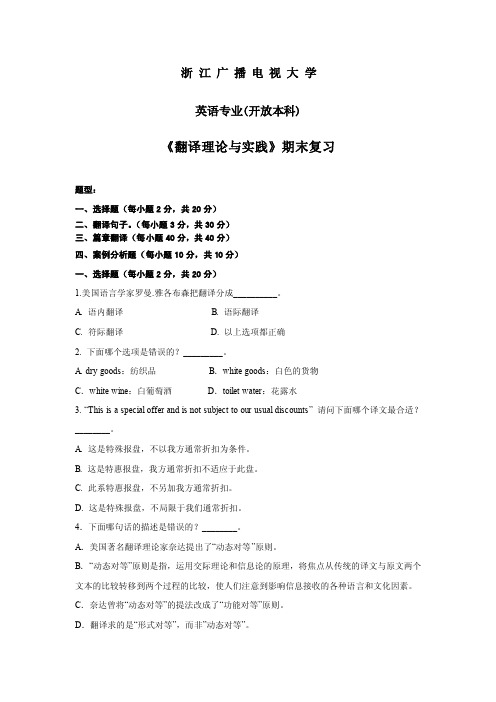
浙江广播电视大学英语专业(开放本科)《翻译理论与实践》期末复习题型:一、选择题(每小题2分,共20分)二、翻译句子。
(每小题3分,共30分)三、篇章翻译(每小题40分,共40分)四、案例分析题(每小题10分,共10分)一、选择题(每小题2分,共20分)1.美国语言学家罗曼.雅各布森把翻译分成__________。
A. 语内翻译B. 语际翻译C. 符际翻译D. 以上选项都正确2. 下面哪个选项是错误的?_________。
A. dry goods:纺织品B.white goods:白色的货物C.white wine:白葡萄酒D.toilet water:花露水3. “This is a special offer and is not subject to our usual discounts” 请问下面哪个译文最合适?________。
A. 这是特殊报盘,不以我方通常折扣为条件。
B. 这是特惠报盘,我方通常折扣不适应于此盘。
C. 此系特惠报盘,不另加我方通常折扣。
D. 这是特殊报盘,不局限于我们通常折扣。
4.下面哪句话的描述是错误的?________。
A.美国著名翻译理论家奈达提出了“动态对等”原则。
B.“动态对等”原则是指,运用交际理论和信息论的原理,将焦点从传统的译文与原文两个文本的比较转移到两个过程的比较,使人们注意到影响信息接收的各种语言和文化因素。
C.奈达曾将“动态对等”的提法改成了“功能对等”原则。
D.翻译求的是“形式对等”,而非”动态对等”。
5._________提出了“美化之艺术,创优似竞赛”的翻译理念。
A.尤金.奈达B.泰特勒C.许渊冲D.鲁迅6. 下面哪个配对是错误的?_____。
A.赤脚医生:barefoot doctor B.纸老虎:paper tigerC.to show one’s cards:摊牌D.大海捞针:look for a needle in seaD B C D C D7.哪句话的描述是正确的?______。
翻译理论与实践课件
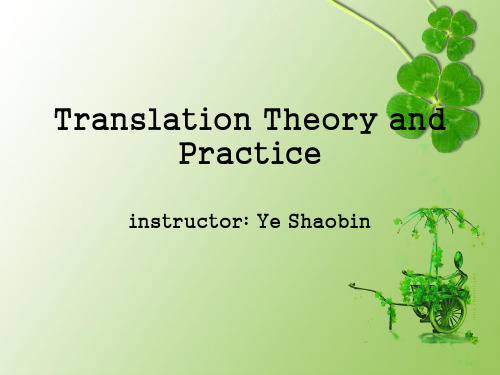
1.1 What is translation?
• The answer to this question varies from person to person because each takes a perspective different from the other. • Etymological study of the word “translation” and “翻译”. • Translation: an act, process or instance of translating. (Webster, p.2429)
D. From the standpoint of the extent to which translation is done:
Full translation(absolute translation), partial translation (selective translation) , translation plus editing (translation with reconstruction)
Theory : 8 periods translation practice: 32 periods
Method: lectures, practice, discussion, presentation Assessment: class participation: 50% (attendence:10%, presentation:10%, translation practice:30%) final examination: 50%
How do people around you think of translation? Is it easy or difficult in their mind? What is your understanding of translation? Why do you need to learn translation as an English major?
翻译理论与实践FinalExam

翻译理论与实践FinalExam翻译理论与实践Final ExamChinese to English自由心灵,简单人生2004年12月3日深夜,我正在网上游走,突然看到“陈省身”几个字从眼前倏然闪过……我把两年前采访陈先生时的合影找了出来,放在书架的正中间。
在我和陈先生背后的墙上,是一只圆形的石英钟,上面的时针清楚地表明了那个瞬间:2002年4月5日13时13分零4秒。
这场雨从睡梦中就下起来,到中午了还在哗啦啦下个不停。
天地间白茫茫一片,街道,车辆,树木,路旁的建筑,撑开了的伞,全都湿漉漉的,显然洗去了不少市面上的喧嚣与浮躁,以及与浮躁同样轻飘飘的漫漫扬絮。
从天津西站到南开大学大约要走二三十分钟,出租司机是一位长相粗犷神色生动的中年人,高喉咙大嗓门,非常热情,一路上用他那地道的天津腔跟我们说话。
我们跟他说起陈先生,他立马接过话说,陈省身?知道。
大数学家,不得了!天津人懂点儿事的谁不知道啊!你要说这陈省身,那可是人才哪。
司机一边骄傲着,一边还要左顾右盼,忙着找路旁哪儿有花店,以方便我们给陈先生买鲜花。
Free Mind And Simple Life 作者:tintinbookIn the deep night of Dec 3 2004, when I was surfing online, suddenly a name ‘Xingshen Chen’popped up from the screen.I searched out the photo I took with Mr.Chen two years ago when I interviewed him, and put it on the middle of bookshelf. On the wall behind Mr.Chen and me, showed by the photo, there is a round quartz clock, whose hands indicate that moment assuredly: 13 minutes and 4 seconds past 1pm, April 5, 2002.It started raining from the midnight all the way through the noon that day. The rain presented a white world and everythinginside was so wet, the streets, vehicles, trees, buildings, and umbrellas. Obviously it removed some light things of the city, noise, fickleness, and also the catkin.It took about 20 to 30 minutes by taxi from West Railway Station of Tianjin to Nankai University, and the driver was a very warm-hearted middle-aged man with a rugged but lively face, and a high voice. He talked all the way with his pure Tianjin accent. When we mentioned Mr.Chen to him, he responded immediately by pouring his knowledge of him such as a renowned mathematician and a great talented man, who is well known by all the Tianjin people. The driver was full of pride and started looking for flower shops so that we could buy some flowers for Mr.Chen.English to ChineseA Few Words about the Utility of PhilosophyNow let us see what intellectual virtues philosophy can provide in the subjects of ethics. The purs uit of philosophy is founded on the belief that knowledge is good, even if what is known is painful . A man imbued with philosophic spirit, whether a professional philosopher or not, will wish his b eliefs to be as true as he can make them, and will, in equal measure, love to know, and hate to be in error. This principle has a wider scope than may be apparent at first sight. Our beliefs spring fr om a great variety of causes: what we were told in youth by parents and school-teachers, what ei ther embodies or allays our fears, what ministers to our self-esteem, and so on. Any one of these causes may or may not lead us to true beliefs. Intellectual sobriety, therefore, will lead us to scruti nize our beliefs closely, with a view to discovering which of them there is any reason to believe tr ue. If we are wise, we shall apply solvent criticism especially to thebeliefs that we find it most pai nful to doubt, and to those most likely to involve us in violent conflict with men who hold opposit e but equally groundless beliefs. If this attitude could become common, the gain in diminishing th e acerbity of disputes would be incalculable.参考译文英译中小议哲学的用途现在我们来看看在伦理学方面哲学可以提供什么样的理智性优点。
翻译理论与实践一
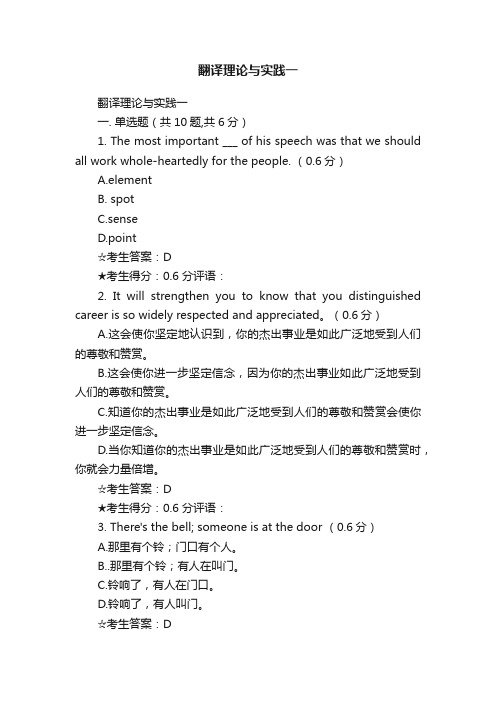
翻译理论与实践一翻译理论与实践一一. 单选题(共10题,共6分)1. The most important ___ of his speech was that we should all work whole-heartedly for the people. (0.6分)A.elementB. spotC.senseD.point☆考生答案:D★考生得分:0.6 分评语:2. It will strengthen you to know that you distinguished career is so widely respected and appreciated。
(0.6分)A.这会使你坚定地认识到,你的杰出事业是如此广泛地受到人们的尊敬和赞赏。
B.这会使你进一步坚定信念,因为你的杰出事业如此广泛地受到人们的尊敬和赞赏。
C.知道你的杰出事业是如此广泛地受到人们的尊敬和赞赏会使你进一步坚定信念。
D.当你知道你的杰出事业是如此广泛地受到人们的尊敬和赞赏时,你就会力量倍增。
☆考生答案:D★考生得分:0.6 分评语:3. There's the bell; someone is at the door (0.6分)A.那里有个铃;门口有个人。
B..那里有个铃;有人在叫门。
C.铃响了,有人在门口。
D.铃响了,有人叫门。
☆考生答案:D★考生得分:0.6 分评语:4. He has left his book here on ___, so that you can read it. (0.6分)A. purposeB. intentionC. aimD. meaning☆考生答案:A★考生得分:0.6 分评语:5. As they haven't a child of their own, they're going to ____a little girl. (0.6分)A. acceptB.receiveC.adaptD. adopt☆考生答案:D★考生得分:0.6 分评语:6. The hatching larvae are parasitic, feeding on the flesh of the host. (0.6分)A. 幼虫在孵化过程中是寄生的,靠寄主的肉为生。
2015翻译理论与实践期末考查试卷
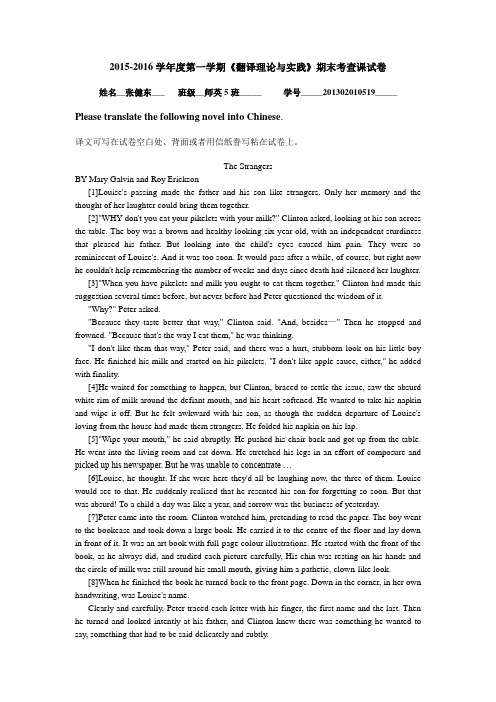
2015-2016学年度第一学期《翻译理论与实践》期末考查课试卷姓名__张健东___ 班级__师英5班_____ 学号_____201302010519_____ Please translate the following novel into Chinese.译文可写在试卷空白处、背面或者用信纸誊写粘在试卷上。
The StrangersBY Mary Galvin and Roy Erickson[1]Louise's passing made the father and his son like strangers. Only her memory and the thought of her laughter could bring them together.[2]"WHY don't you eat your pikelets with your milk?" Clinton asked, looking at his son across the table. The boy was a brown and healthy-looking six-year-old, with an independent sturdiness that pleased his father. But looking into the child's eyes caused him pain. They were so reminiscent of Louise's. And it was too soon. It would pass after a while, of course, but right now he couldn't help remembering the number of weeks and days since death had silenced her laughter.[3]"When you have pikelets and milk you ought to eat them together." Clinton had made this suggestion several times before, but never before had Peter questioned the wisdom of it."Why?" Peter asked."Because they taste better that way," Clinton said. "And, besides—" Then he stopped and frowned. "Because that's the way I eat them," he was thinking."I don't like them that way," Peter said, and there was a hurt, stubborn look on his little-boy face. He finished his milk and started on his pikelets. "I don't like apple sauce, either," he added with finality.[4]He waited for something to happen, but Clinton, braced to settle the issue, saw the absurd white rim of milk around the defiant mouth, and his heart softened. He wanted to take his napkin and wipe it off. But he felt awkward with his son, as though the sudden departure of Louise's loving from the house had made them strangers. He folded his napkin on his lap.[5]"Wipe your mouth," he said abruptly. He pushed his chair back and got up from the table. He went into the living room and sat down. He stretched his legs in an effort of composure and picked up his newspaper. But he was unable to concentrate …[6]Louise, he thought. If she were here they'd all be laughing now, the three of them. Louise would see to that. He suddenly realised that he resented his son for forgetting so soon. But that was absurd! To a child a day was like a year, and sorrow was the business of yesterday.[7]Peter came into the room. Clinton watched him, pretending to read the paper. The boy went to the bookcase and took down a large book. He carried it to the centre of the floor and lay down in front of it. It was an art book with full-page colour illustrations. He started with the front of the book, as he always did, and studied each picture carefully, His chin was resting on his hands and the circle of milk was still around his small mouth, giving him a pathetic, clown-like look.[8]When he finished the book he turned back to the front page. Down in the corner, in her own handwriting, was Louise's name.Clearly and carefully, Peter traced each letter with his finger, the first name and the last. Then he turned and looked intently at his father, and Clinton knew there was something he wanted to say, something that had to be said delicately and subtly."You like that book, don't you?" Clinton asked."Yes," Peter said. There was a silence, and then he said, "It belonged to my mother, didn't it?""Yes," Clinton said. "I gave it to her myself. As a matter of fact, she rather cherished that book."[9]Peter's youthful gravity filled the room. He looked very small and alone. And then Peter said, using his father's phrasing, so foreign to his own vocabulary, "As a matter of fact, I rather cherish this book, too." He was trying, Clinton guessed, to make his plea for affection, his cry of loneliness sound irrelevant, as if it had no connection with the conversation.[10]Clinton swallowed to release the sudden tightness in his throat; the newspaper slid to the floor and he held his arms open to his son. "Come here, Peter," he said.But Peter hadn't finished yet. "If you want me to eat apple sauce, I'll do it," he said. "And if you don't want me to drink my milk without my pikelets, I won't do it. I mean if-""I know what you mean," Clinton said, laughing. "You can do just as you please about either of them. Now come here and let me wipe your mouth."[11]Peter bounced across the room and in one second he was on the chair and in his father's arms. And they were laughing, both of them, just as they used to laugh when Louise was there.陌生人高尔文玛丽,罗伊埃里克森著:路易丝的过世使父亲和他的儿子像陌生人一样。
- 1、下载文档前请自行甄别文档内容的完整性,平台不提供额外的编辑、内容补充、找答案等附加服务。
- 2、"仅部分预览"的文档,不可在线预览部分如存在完整性等问题,可反馈申请退款(可完整预览的文档不适用该条件!)。
- 3、如文档侵犯您的权益,请联系客服反馈,我们会尽快为您处理(人工客服工作时间:9:00-18:30)。
翻译理论与实践Final Exam
Chinese to English
自由心灵,简单人生
2004年12月3日深夜,我正在网上游走,突然看到“陈省身”几个字从眼前倏然闪过……我把两年前采访陈先生时的合影找了出来,放在书架的正中间。
在我和陈先生背后的墙上,是一只圆形的石英钟,上面的时针清楚地表明了那个瞬间:2002年4月5日13时13分零4秒。
这场雨从睡梦中就下起来,到中午了还在哗啦啦下个不停。
天地间白茫茫一片,街道,车辆,树木,路旁的建筑,撑开了的伞,全都湿漉漉的,显然洗去了不少市面上的喧嚣与浮躁,以及与浮躁同样轻飘飘的漫漫扬絮。
从天津西站到南开大学大约要走二三十分钟,出租司机是一位长相粗犷神色生动的中年人,高喉咙大嗓门,非常热情,一路上用他那地道的天津腔跟我们说话。
我们跟他说起陈先生,他立马接过话说,陈省身?知道。
大数学家,不得了!天津人懂点儿事的谁不知道啊!你要说这陈省身,那可是人才哪。
司机一边骄傲着,一边还要左顾右盼,忙着找路旁哪儿有花店,以方便我们给陈先生买鲜花。
Free Mind And Simple Life 作者:tintinbook
In the deep night of Dec 3 2004, when I was surfing online, suddenly a name ‘Xingshen Chen’popped up from the screen. I searched out the photo I took with Mr.Chen two years ago when I interviewed him, and put it on the middle of bookshelf. On the wall behind Mr.Chen and me, showed by the photo, there is a round quartz clock, whose hands indicate that moment assuredly: 13 minutes and 4 seconds past 1pm, April 5, 2002.
It started raining from the midnight all the way through the noon that day. The rain presented a white world and everything inside was so wet, the streets, vehicles, trees, buildings, and umbrellas. Obviously it removed some light things of the city, noise, fickleness, and also the catkin.
It took about 20 to 30 minutes by taxi from West Railway Station of Tianjin to Nankai University, and the driver was a very warm-hearted middle-aged man with a rugged but lively face, and a high voice. He talked all the way with his pure Tianjin accent. When we mentioned Mr.Chen to him, he responded immediately by pouring his knowledge of him such as a renowned mathematician and a great talented man, who is well known by all the Tianjin people. The driver was full of pride and started looking for flower shops so that we could buy some flowers for
Mr.Chen.
English to Chinese
A Few Words about the Utility of Philosophy
Now let us see what intellectual virtues philosophy can provide in the subjects of ethics. The purs uit of philosophy is founded on the belief that knowledge is good, even if what is known is painful . A man imbued with philosophic spirit, whether a professional philosopher or not, will wish his b eliefs to be as true as he can make them, and will, in equal measure, love to know, and hate to be in error. This principle has a wider scope than may be apparent at first sight. Our beliefs spring fr om a great variety of causes: what we were told in youth by parents and school-teachers, what ei ther embodies or allays our fears, what ministers to our self-esteem, and so on. Any one of these causes may or may not lead us to true beliefs. Intellectual sobriety, therefore, will lead us to scruti nize our beliefs closely, with a view to discovering which of them there is any reason to believe tr ue. If we are wise, we shall apply solvent criticism especially to the beliefs that we find it most pai nful to doubt, and to those most likely to involve us in violent conflict with men who hold opposit e but equally groundless beliefs. If this attitude could become common, the gain in diminishing th e acerbity of disputes would be incalculable.
参考译文英译中
小议哲学的用途
现在我们来看看在伦理学方面哲学可以提供什么样的理智性优点。
人们追求哲学是因为确信知识是有益的,即便所追求到的知识可能会令人痛苦。
凡具有哲学精神的人——不管他是不是职业哲学家——总是会在力所能及的范围内使自己的信念成为真理,总是会同等程度地热爱真知、憎恨谬误。
这个道理的实际应用范围比其表面上显示的应用范围要广一些。
我们的信念植根于诸多因素:有我们少年时代的父母和学校老师告诉我们的东西,有标志我们恐惧者,有使我们坦然者,也有让我们自尊自敬者,如此等等。
这些因素中的任何一个因素都可能导致我们获得正确的信念或错误的信念。
因此,只有清醒的理智才会引导我们仔细考察我们的信念,让我们发现其中哪些信念有理由使人相信它们是真理。
如果我们真是明智的,那么,对那些我们最不情愿怀疑的信仰,对那些最有可能造成我们与持相反的无理信念者相互激烈冲突的信念,我们就最应该进行瓦解性批判。
获奖译文
关于哲学功用之小议作者:darkecho
现在,我们先来看一下哲学对伦理道德有哪些裨益。
对于哲学的追求,往往基于一种信仰——知识是美好的,尽管对于它的索求可能是痛苦的。
不管是哲学家与否,一个被灌输了哲学思想的人,一定希望他的信念是真实的;同样地,他也一定愿意了解更多,不愿犯错。
这虽是显而易见的道理,却有着更广阔的含意。
我们的信念源自各处:那些小时候父母和老师告诉我们的,那些能体现或减轻我们恐惧的、那些服务于我们自尊的……这其中的任何一个或许会引领我们找到真实,却也可能没有一丝帮助。
所以,清醒严谨的思维能让我们仔细审查自身的信念,以便找出那些有理有据的信念。
有的时候,我们会发现要对某些信念质疑是件痛苦的事,有的更会把我们卷入与持相反意见的人们的激烈冲突之中——尽管他们的信念同样的没有根据。
如果我们是明智的话,就应对其提出适当的指责。
如果这种态度能被广泛取纳,减少尖刻争论的成效将会是无可限量。
